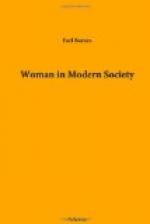At the same time it is desirable to note present differences in modes of thinking and feeling, for while they may have been produced by environment and ideals, and may hence give way to education, they must be reckoned with in making the next steps. In the chapter on education we shall discuss certain academic peculiarities of women’s minds, but here we are interested in seeing what fundamental differences characterize the thinking of the sexes.
Women seem more subject to emotional states than men;[10] and this general observation agrees with the fact that the basal ganglia of the brain are more developed in women than in men, and these parts of the brain seem most intimately concerned with emotional activity. Whether emotion follows acts or leads to acts remains a disputed question, but certainly emotion gives charm and significance to life and distinguishes modes of thinking. Particularly in the dramatic art, this quality of mind gives women special excellence. The fact that she more often appeals to emotion than to reason, as cause for action, in no way marks her as inferior to man, but simply as different. As Ellen Key says: “There is nothing more futile than to try to prove the inferiority of woman to man, unless it be to try to prove her equality."[11]
[10] Helen Bradford Thompson, Psychological Norms in Men and Women, p. 171, University of Chicago Press, 1903.
[11] ELLEN KEY, Love and Ethics, p. 52. New York: Huebsch, 1911.
Most women think in particulars as compared with men. The individual circumstance seems to them very important; and it is hard for them to get away from the concrete. On the other hand, a man’s thinking is more impersonal and general; and he is more easily drawn into abstractions. It is true that woman’s domestic life would naturally develop this quality but we are not now concerned with the question of origins. Most women find it easy to live from day to day; the man is more given to systematizing and planning. Thus in offices, men are more efficient as heads of departments, while women handle details admirably. In public life we have recently seen thousands of women eager to depose a United States Senator, accused of polygamy, without regard to the bearing of the concrete act on constitutional guarantees. Women have done little with abstract studies like metaphysics; they have done much with the novel, where ideas are presented in the concrete and particular.
This habit of dealing with particulars, and disinclination for abstraction, leads easily to habitual action. It is easy for women to stock up their lower nerve centers with reflex actions. This, of course, goes along with the general anabolic characteristics of the sex. Hence women are the conservers of traditions; rules of conducting social intercourse appeal to them; and they are the final supporters of theological dogmas.[12] Women naturally uphold caste, and Daughters of the Revolution and Colonial Dames flourish on the scantiest foundations of ancestral excellence. Man, on the other hand, is more radical and creative. He has perfected most of our inventions; he has painted our great pictures; carved our great statues; he has written music, while women have interpreted it.




